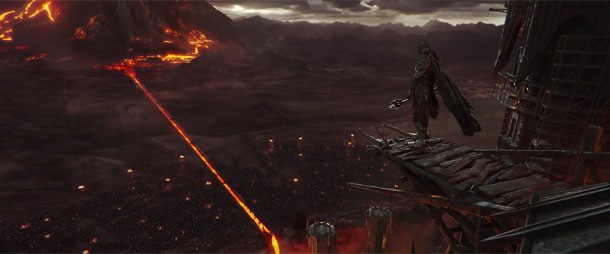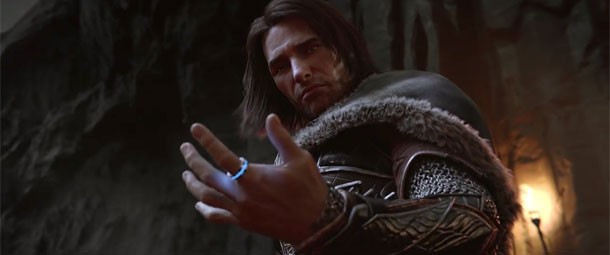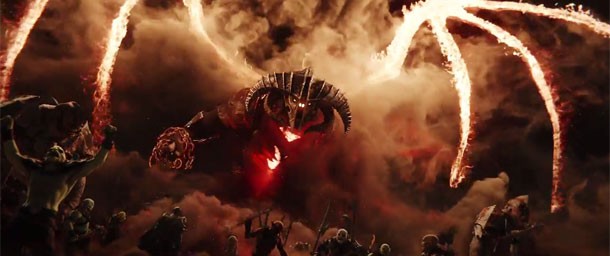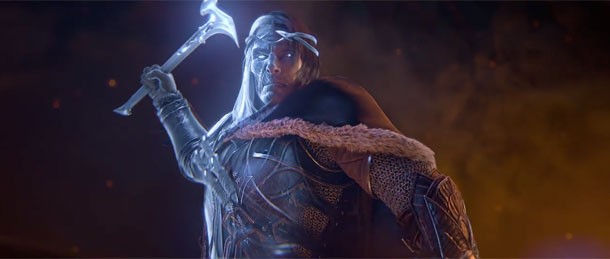Why We're Excited (And Hesitant) About Middle-earth: Shadow Of War

Earlier this week, Warner Bros. Interactive Entertainment and Monolith Productions formally announced a sequel to Middle-earth: Shadow of Mordor. The game, Shadow of War, begins right after the events of the first game, following Talion as he continues his revenge-fueled plan to stop Sauron and his gathering forces. Like a lot of players, Matt Miller and I enjoyed the first game, and we’re optimistic about the sequel – with some slight reservations. Check out our conversation to see why we’re excited, as well as some of the hurdles Monolith is going to have to overcome with this new game.
Jeff C: Hey, Miller! You’re a big ol’ Lord of the Rings nerd, right?
Matt M: Yep. I am a fan of world-building in all its incarnations, and there are few worlds as intricately constructed as Tolkien’s Middle-earth. I also wrote our cover story on Shadow of Mordor and our review, so I’m pretty clued in about this series. We don’t know a whole lot about Shadow of War, but with an official sequel finally announced, it seemed like an appropriate time for some conjecture. What should we talk about first?
Jeff C: This reveal has me torn. I enjoyed Shadow of Mordor, and I’ve had a lot of great times with the various Lord of the Rings games and movies over the past decade or so. But at the same time, the last few Hobbit films sucked a lot of the enthusiasm I had for that world right out of me. I’m at a point where I feel like I’ve explored every corner of Middle-earth and met everyone I could possibly want to meet. Am I excited to see a refined version of the Nemesis system? Sure. Do I want to walk around a volcanic wasteland again? Not really. What do you think? Is there a chance we’ll see anything fundamentally new here? Because looking at that trailer, it seemed like a remix of characters, creatures, and moments I’ve seen before. When a Balrog is boring, that’s a problem.

Matt M: I think Monolith is a really talented studio, and Shadow of Mordor had a lot of fascinating innovation, not to mention a stellar combat system. But the game felt like it ran out of steam about halfway through, and that the last third was rushed. I’m eager to see what the developers can do with several more years under their belts to hammer out the systems and improve the experience.
I do think there’s potential for new locations and experiences for their story, but I share your concern about pre-war Mordor being a pretty bleak place to return to. Part of me almost wishes they were using the same system, but jumping to a different point in the Middle-earth storyline. For instance, I’d love to see them tackle something like the The Tale of Beren and Luthien, which is this great adventure that unfolds in The Silmarillion, and bring their unique brand of action to some of the great stories further back in the timeline. As it is, I’m sure there’s a sense they’ve established a popular character with Talion, and they don’t want to abandon him.
To be fair, even though I didn’t love the ending, the last game did end on a sort of cliffhanger, so they’re kind of obligated to follow up.
Jeff C: I think the timeline is another sticking point for me. I was fine with the first one – which I’m sure made it easier for Monolith to sleep – but this one seems to be butting up against the events of the Fellowship of the Ring even closer. And the closer you get, the more it becomes clear that none of this stuff ultimately matters. Talion will fail in whatever he attempts to do, and it’s up to a bunch of Hobbits to save the day. That’s a dismissive way to put it, and Rogue One showed that you can tell side stories that are entertaining even within a limiting time-frame.
Matt M: I think your Rogue One mention is apt. I suspect Monolith is steering toward a plot of “the untold story” of how what Talion and Celembrimbor do might have been forgotten by history, but that it’s his interference that slows down Sauron just enough that the Fellowship can get underway and survive.
On the story front, I think it’s worth acknowledging that Shadow of Mordor told a somewhat unconventional hero story. Talion is mostly out for revenge, and is less interested in saving the day. If Monolith follows the trend of a classic Middle-earth fable, then Talion’s path is doomed to be a tragic one. Lord of the Rings fiction is littered with heroes who become obsessed with power (sometimes in the name of something good) and the way it brings them to tragedy. Given that Talion and Celembrimbor end the last game declaring that they’re going to go and construct a new ring of power does not bode well for their future.

Jeff C: I think your use of the word “littered” points to my concern. Moving on, are there any locations or key events that you think might offer players anything new? This is pure speculation, of course, but were there places that seemed like no-brainers for Shadow of Mordor that we didn’t get to visit? Basically, I’m looking for something other than volcanic glass and sad scrubland.
Matt M: Well, to be fair, in the years since I played Shadow of Mordor, some of the details have faded away. I recall that the Black Gate figured prominently, and was the site of the big conflict that concluded the game. But I do think there are places we can go that the last game didn’t fully explore. Clearly, one of the big sites we’re going to get to see is Mount Doom, where our heroes appear in this trailer. It also seems like we could have some cool explorations of places like Minas Morgul or Cirith Ungol – places that have a deep connection to The Lord of the Rings lore.
Jeff C: Do you have any big hopes for the Nemesis system 2.0? I’d like to see bigger armies and get a sense that we’re part of some of the large-scale battles the films showed. The first game felt like I was constantly picking off remnants of a larger force – though to be fair, that could have been somewhat related to the fact that the game was also being developed with last-gen hardware in mind. Now that the PS3 and Xbox 360 have sailed across the sea (and current-gen development is even more mature), I’m excited to see what Monolith can offer.
Matt M: Agreed. The Nemesis system is a brilliant innovation that has yet to be topped by other games in the field. It supports an emergent approach to enemy dynamics, and encourages players to craft their own personal stories about who they’re fighting. However, sometimes in the first game it just didn’t work the way it was supposed to. Sometimes a character would show up as a hated enemy, and I just had no memory of who he was. The “nemesis” I fought near the game’s conclusion was a complete no-name who I had no personal connection with. The best moments of the Nemesis system was when a memorable fight ended in a cool way, and then I saw that guy again later, like if I burned an Uruk who ran away, and then he showed up later with a scarred face and revenge on his mind. I hope they find ways to make the procedural elements of the Nemesis system gain a more crafted quality, so that I can feel connected to the battles and enemies I’m confronting.
What about combat itself? For me, the melee systems were one of the highlights of the first game, but that doesn’t mean I wouldn’t mind seeing some new tricks and approaches to battles. What were some of the things you liked best in the original, and that you’d like to see continue to evolve?

Jeff C: The melee combat was definitely a high point, and I loved being able to frighten enemies with displays of raw power. At the same time, I never felt like I fully mastered all of its systems. I was able to progress at a steady clip, but it never clicked with me the same way that Batman's Arkham games did.
Ultimately, I think one of the main issues I have stems with having a game set even later at this point in the timeline. Things are pretty urgent, with Sauron gathering his forces to take over the world. It’s an imminent threat – you can see Mount Doom on the horizon, and it looks pretty angry. Suddenly, few of the open-world activities that we typically enjoy make much sense – even the hunting activities from the first game. As much fun as it might be to kill some of those ugly Warg things for a dwarf, we clearly have more pressing things to attend to. I love open world games, but the format doesn’t fit the urgency of the narrative very well in this case, and it’s weird to wave it away.
Matt M: It should be interesting to see how they address that element of narrative dissonance, if at all. They may ultimately shoulder past that point in the name of giving people more of what they liked about the game. However, it’s also possible they’ll play up the idea that Talion is now in a delaying action, holding off the forces of Sauron for as long as he can while he lets the rest of the good guys martial their defenses. In that case, his open-world wanderings would need to be cast as ways he is preparing for conflict, but not necessarily as activities that are completely separate from his goals of building power to confront Sauron. Any way you cut it, though, going on a nice pleasant hunt while the nearby orc army is murdering some human children is going to feel a little weird.
Jeff C: We’ll have to wait a bit longer to see how they address that – if they do at all. And I wouldn’t mind seeing some actual gameplay, either. We’re basing all of our excitement and trepidation on a trailer, which obviously isn’t going to be the most accurate representation of the game. But based on what Warner and Monolith have said about the game and its setting, I’m fairly lukewarm about the whole thing. Hopefully, seeing the game in action and learning more about it on March 8 will rekindle my love of that world.
Matt M: I think I might be a little hotter on the possibilities of this game than you are, at this point. I really liked the first one, even though I felt like it went a little bit off the rails in the final hours. The melee system was amazing, the Nemesis system was innovative (even if it needed a little more time in the oven) and I have a deep fondness for the fiction – and I’m not feeling as worn out on the setting as it sounds like you might be. As such, I’m hoping Shadow of War allows Monolith to polish up elements that weren’t great in the first game, and hopefully wrap up a meaningful arc for Talion and his elven wraith buddy-in-arms.
But I think that sense of Lord of the Rings exhaustion is a real dilemma after so many years of pop-culture presence. It’s up to Monolith to find something fresh in that content, and express it through a game that feels like both a worthy follow-up for existing fans, but also a project that can stand strong on its own.

Get the Game Informer Print Edition!
Explore your favorite games in premium print format, delivered to your door.
- 10 issues per year
- Only $4.80 per issue
- Full digital magazine archive access
- Since 1991









